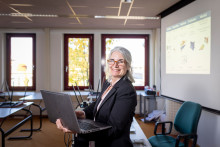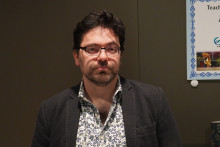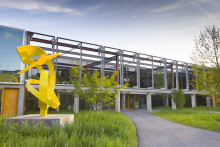rubicon
Rubicon aims to encourage talented researchers who recently received their PhD to spend some time at top research institutes outside the Netherlands to further their scientific career. The programme allows them to do their research at a foreign institute that offers the best environment for their work.
In the 2022 round, fifteen young academics have been awarded the grant – with UT researcher Robbin Jan van Duijne among them. The researcher from the Faculty of Geo-Information Science and Earth Observation (ITC) will use the grant to spend 24 months at Columbia University, where he will focus on his project ‘How can we more accurately forecast climate migration flows? Towards granular projections’. He will receive 140.000 euros for this research.
Why did you apply for the Rubicon grant?
Van Duijne: ‘I’m very interested in the topic of climate migration. I believe it is one of the most pressing societal issues today. In fact, it is already emerging and it will only keep escalating. In the Netherlands, however, little research is done on this topic. I browsed institutions that focus on it and Columbia University’s Climate School is a worldwide leader on this. The project idea and the work being done at Columbia University nicely aligned with the goal of the Rubicon grant, and so I decided to apply. My work has become very nomadic: I am on all continents. I live in Europe, my research focuses primarily on Asia and I will be conducting it in America.’
What type of research will you be doing at Columbia?
‘The research idea revolves around forecasting models for climate migration. These models could potentially tell how many people will be on the move due to climate change impacts. They predict, for example, how many people will be displaced if the sea level rises by a couple of centimeters. The current models come up with very high numbers of people forced to permanently move. The most recent estimate is 150 million people being displaced by 2050. I’m critical of these numbers and want to create more accurate forecasting models.
During my research, I did a lot of fieldwork in India in areas where many people are affected by a changing climate. When I talked to people there, I found out that, even though their livelihood is heavily impacted, they don’t want to leave. It is their home, they are highly embedded in the local community or caste and they don’t want to move, not even when facing floods or droughts. If a family loses agriculture as their livelihood, instead of leaving, they choose for the male to migrate for work while the rest of the family stays behind. The current models don’t take this into account. I want to create more accurate forecasting models that include the importance of labour migration.’
Robbin Jan van Duijne
How will you achieve that?
‘I have data from individual villages in India, showing how many males have migrated for work. I will overlay this with climate data, meaning the latest models predicting how climate change will impact different areas. This should allow me to see where the labour migration will start and how it will develop. In Europe, migration research assumes that the entire family migrates, but that doesn’t often happen. When you talk to people, you get a completely different perspective than the models suggest. That is why I always combine big data sets with actually visiting the affected communities. At Columbia University, I will work with both advanced modelers and social scientists.’
Would this research be possible without the Rubicon grant?
‘Getting the grant is really big news for me and I’m extremely happy about it. Science is very competitive. Even if you are passionate about your work, it’s difficult to get your research ideas funded. This research would certainly not be possible without the Rubicon, especially not at this scale.’
Do you know when you will begin your research in New York?
‘Hopefully next year. I’m first travelling to Delhi for three months thanks an Embassy Science Fellowship from NWO in collaboration with the Dutch Ministry of Foreign Affairs. I will work directly with the Dutch embassy in India. There has been an agrarian crisis in India with many farmers protesting. The embassy has therefore asked a scientist to join and work with them on the issue of agricultural reforms, trying to determine the key problems. I’m really excited about this opportunity because it will give me direct access to top-level policy makers. Making societal impacts is extremely important to me.’







